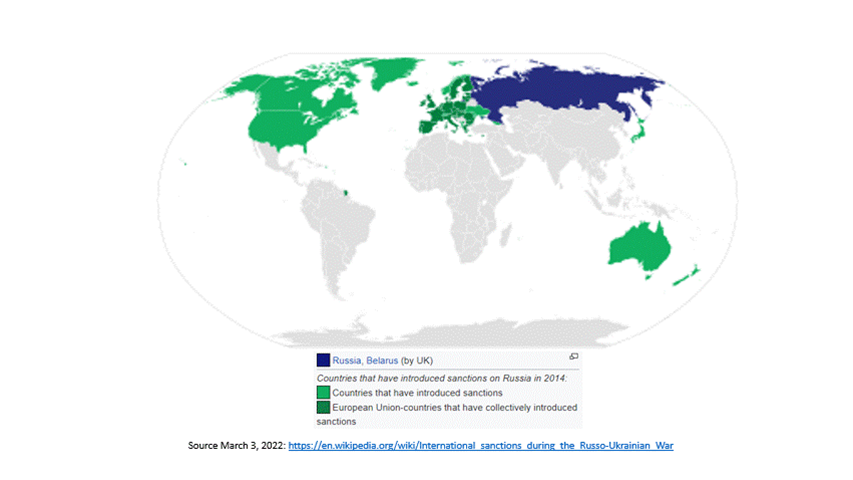Banking systems shut out sanctioned Russian entities

Commercial and Central Banking systems across the globe have shut their doors to sanctioned Russian entities in response to Russia’s invasion of Ukraine. Seven major Russian banks are banned from using SWIFT, the ubiquitous global bank to bank payment messaging system, and the G7 has frozen the foreign reserve assets of Russia’s Central Bank held in the G7 countries.

Mastercard, Visa, Apple Pay and Google Pay have blocked sanctioned Russian institutions from using their payment networks, stopping payments from these Russian banks’ cardholders. Long lines of worried Russians have formed at ATMs across their country as they wait to withdraw their devalued Russian Rubles, so they have the safety of cash holdings rather than risk their savings in troubled sanctioned banks.
Cryptocurrency networks as an alternative
Russians are turning to cryptocurrency networks to safeguard their money but here too they are limited in where they can buy or transfer it. The on and off ramps to cryptocurrency networks are where sanctioned entities can be blacklisted, whether those ramps are wallets or API services inside cryptocurrency networks or at centralised exchanges that most average crypto traders use.
Of course, not all organisations managing the on and off ramps to cryptocurrency networks are willing to enforce sanctions. There are plenty of holes in cryptocurrency network sanction enforcement, but the noose is definitely tightening around the sanctioned entities.
Consider these facts:
- Analyses from blockchain intelligence firms show substantially increased movement of Russian owned cryptocurrency out of Russian exchanges into their own self hosted wallets or dark markets. They are unable to move their money to centralised exchanges that are complying with sanctions.
- Cryptocurrency movement even within Ethereum blockchain networks accessed via Metamask and Infura (both owned by Consensys) is also now being restricted to users in ‘certain areas’ according to Consensys’ blog: MetaMask and Infura cannot serve certain areas Presumably those are areas where sanctioned entities operate.
- Of course, sanctioned Russian entities can try to disguise their locations and can use a host of methods to fool sanction enforcers about their real locations or even identities used for KYC at centralised exchanges. Location based restrictions only go so far and KYC Identity Proofing is similarly vulnerable.
- There are global efforts to blacklist blockchain addresses of sanctioned Russian entities.
Here too there are issues as it is not always possible to identify a blockchain address owner, especially when that owner moves the cryptocurrency through mixers or privacy coins. And as noted above, not all exchanges will adopt blacklists to keep sanctioned address owners that are identified off their platforms. - Security is never perfect. The idea is to make it harder and harder for the bad guys to operate.
Indeed, the noose is tightening around the sanctioned users and their financial lives are undoubtedly getting more complicated and harder to navigate. Even if they manage to get their money out of the banks or blockchain addresses they are now held in, these individuals are severely limited in where and how they can spend it, given the growing list of travel and payment network restrictions.
Brighter future for cryptocurrency networks
All of this points to more adoption of cryptocurrency in the long term. This is especially true for stablecoins that are in high demand now by Russians trying to save themselves from financial collapse.
Recent events prove it’s much harder to censor speech and financial transactions in decentralised networks than it is in centralised ones. In fact, it’s impossible unless you can identify the off-chain address owner individual that you want to censor. Again, It’s the on and off ramps where the user can be censored, and the censors must be ubiquitous for them to be fully effective.
Trust the protocol
Cryptocurrencies (and stablecoins especially) are a safe haven if you live in a country where your currency is devaluing. It’s all about trusting the protocol instead of trusting the government (or any given centralised entity).
The Russian invasion of Ukraine has proven beyond any doubt that computer protocols are infinitely more trustworthy than certain governments are. The value of cryptocurrency relative to some fiat currencies should be clear if it hasn’t been already.
This article was republished with permission from Gartner Blog Network.




_(23).jpg&h=140&w=231&c=1&s=0)






 iTnews Executive Retreat - Security Leaders Edition
iTnews Executive Retreat - Security Leaders Edition
 iTnews Benchmark Awards 2026
iTnews Benchmark Awards 2026
 iTnews Cloud Covered Breakfast Summit
iTnews Cloud Covered Breakfast Summit
 The 2026 iAwards
The 2026 iAwards












_(1).jpg&h=140&w=231&c=1&s=0)



